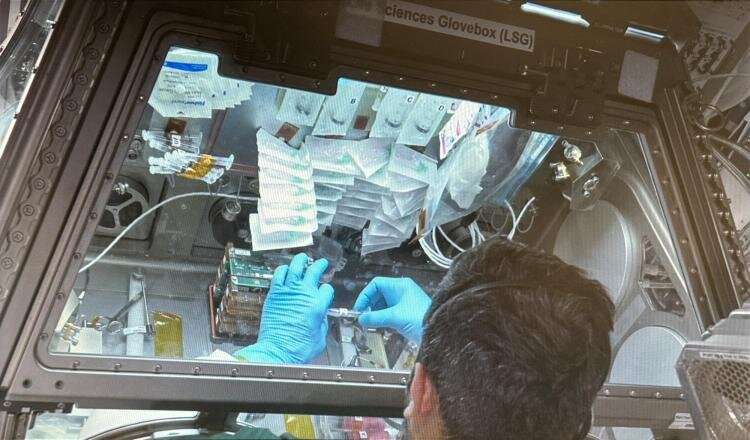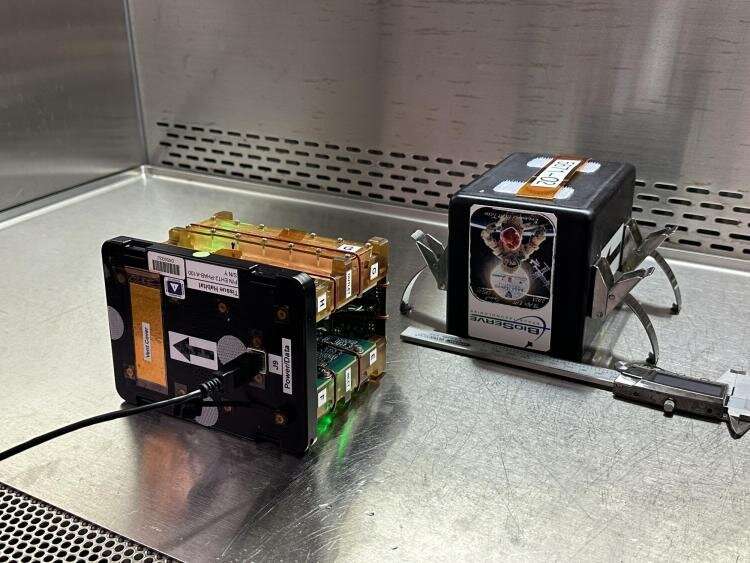This article has been reviewed according to Science X's editorial process and policies. Editors have highlighted the following attributes while ensuring the content's credibility:
fact-checked
trusted source
proofread
Heart experiments to help astronauts live better in space

Astronauts aboard the International Space Station are hard at work on research guided by students and researchers from the University of Colorado Boulder.
Two cardiovascular tissue experiments were launched to the ISS aboard SpaceX CRS-27 on March 15, 2023, and CU Boulder's BioServe Space Technologies developed the hardware for both. The research stems from National Institutes of Health grants led by Stanford University and Johns Hopkins University.
"When astronauts go to space it can have negative impact on their cardiovascular systems," said Stefanie Countryman, director of BioServe. "Our organs evolved to work here on Earth so they function differently in space. The goal with both of these projects is to better understand how these treatments impact cardiovascular issues in Earth bound people and to advance treatments that could be provided to astronauts before launch or while in space."
BioServe has been designing, building, and flying microgravity life science research experiments and hardware since 1987. Government space agencies, universities, and private companies like SpaceX frequently contract with BioServe to take advantage of the center's longstanding experience in space research.
The two experiments launched on March 15 include specialized hardware developed by BioServe specifically for these projects and will also utilize BioServe's Space Automated Bioproduct Lab, an orbiting incubator that has been in use on ISS since 2015.
Past heart studies have shown that just four weeks of microgravity exposure causes significant changes in cell function and gene expression that could lead to long-term damage or cardiac muscle atrophy.

The Stanford experiment utilizes simplified heart tissues to test pharmaceuticals that could reduce microgravity-induced changes in heart cell function. Meanwhile the Johns Hopkins project aims to study human cardiomyocyte functional performance and the potential of specific therapeutics to prevent negative impacts.
While both projects are intended to help astronauts in space, the research could eventually also improve life for people here on Earth suffering from heart conditions due to aging or abnormalities that lead to a weakening of the heart muscle.
"Being able to design the hardware to support research like this for cell cultures and tissue engineering is very specialized," Countryman said.
In addition to the hardware development, BioServe also conducts live uplinks with astronauts to walk them through the experiments. As both a research facility and educational center, BioServe employs full time staff and students to advance their work.
"Undergrad and grad students are responsible for assembly of hardware and kit design and helping during uplinks with the crew. Students are an integral part of operations," Countryman said.
The one downside to working with astronauts is frequent late nights. ISS astronauts live and work on Coordinated Universal Time, so the crew day begins at 1:30 a.m. Colorado time. That means uplinks frequently occur long after most Americans have gone to sleep.
"It's a small price to pay to work with people in space," Countryman said.
Provided by University of Colorado at Boulder





















